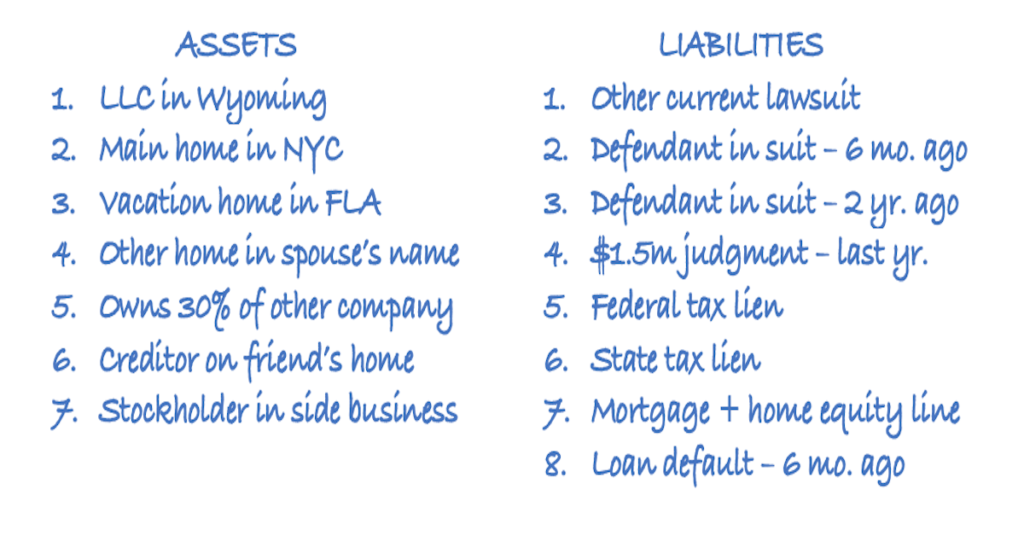

Before filing a lawsuit, make sure you take the appropriate steps. An asset search by a private investigator helps you decide whether to sue.
An asset search by a private investigator can determine whether to take action A venture capitalist client once wanted to find out whether it was worth suing the CEO of a healthcare startup he had funded. The company had filed for bankruptcy. We conducted an asset search and found the CEO owned three luxurious homes, as well as several investment properties. But upon deeper inspection, we discovered all of his properties were heavily mortgaged. Another entity was quite far along in obtaining a separate judgment against him as well. As a result of this information, my client decided not to proceed with his lawsuit. Had we not investigated the at-fault CEO, our client would have found himself in a precarious position. Likely, he never would have seen the judgment money. Everyone saved time, money, and energy by avoiding a futile legal battle. Do the groundwork to make an informed decision on the appropriateness of a lawsuit.
Does a lawsuit make sense?
Because lawsuits are expensive, when deciding whether to take on a case, even one with a potentially sizeable judgment, attorneys must determine whether the effort is worth the money. Is the plaintiff likely to win? Even if they do, how likely is it they can recover any assets from the defendants? How do you determine the answers to these questions? That’s where Waterfront Intelligence comes in.
Is the defendant wealthy — or is he broke?
A private investigator will do the behind-the-scenes work to discover details with regard to a person’s assets. The financial situation of an individual is not always as obvious as you might think. Is the person actually wealthy? Or is he broke? Has he perfected the art of looking poor?
Find hidden assets
Sometimes debtors want to look poor. They know that attorneys often deem cash-strapped, heavily-leveraged individuals and businesses unworthy of lawsuits, even if they’re likely to be found at fault. To avoid a lawsuit, debtors will sometimes take actions to make themselves appear broke. Debtors will play the game, but a private investigator will see their moves and find hidden assets.
What will an asset search by a private investigator reveal?
Here’s what a comprehensive asset search will uncover, as well as the red flags we’ve found over time:
Property assets
An asset search will show real estate and personal property held in the debtor’s name, either individually or jointly with a spouse. What a search can reveal: questionable transactions such as recent transfers that have been made with the intent of shielding it from attachment. This might look like property moved to a spouse, partner, business entity, or trust. We’ll help you find hidden assets. Sometimes, a person’s online activity can reveal connections that the plaintiff may not have considered. For example, social media posts made by the debtor or a spouse may point an investigation in the direction of another jurisdiction. The subject may not own property in his name, but he may own several California properties through another LLC. This is a potentially attachable asset in a judgment.
False liens
A comprehensive asset search will include a lien search. Property, tax, and other liens can affect your ability to collect against a defendant’s assets. What a search can reveal: debtors attempting to make themselves appear cash-strapped. A private investigator will uncover details of current mortgages and Uniform Commerical Code records. For example, in one case we investigated, a client wanted to sue an individual who owned a large home. We discovered the individual had a huge mortgage attached to it. The bank holding the mortgage was supposedly based in Panama. We found no such bank and believed the mortgage to be a false lien. With this information, the client decided to proceed with the lawsuit.
Additional business connections
A private investigation can identify entities connected with a defendant. These may include corporations, partnerships, LLCs, trusts, or other entities whose records can be subpoenaed. What a search can reveal: shell or parent companies that hold the majority of the company’s assets. For example, a client of ours wanted to sue the owner of a cannabis company for a substantial amount. At first glance, the owner did not appear to have valuable assets, and neither did his company. However, our private investigators dug deeper and found another LLC with the same California address as the cannabis company. It also had a similar name and the same registered agent. The cannabis company was essentially just a brand. The other LLC actually owned the assets of the company. This information was the impetus for our client to go ahead with the lawsuit.
Additional bank accounts
Bank account information itself cannot be disclosed without a subpoena. However, an asset search may reveal other useful information. What a search can reveal: the existence and the whereabouts of bank accounts mentioned in lawsuits. From there, the account information can be subpoenaed.
Get the whole picture
Cases with large potential judgments require significant investments with regard to a law firm’s time, money, and energy, even if the odds look good for a judgment in the plaintiff’s favor. When deciding whether to take on such a case, a comprehensive asset search by a private investigator can be invaluable. Maybe yours will reveal a supposedly cash-strapped individual as someone with surprisingly deep pockets. We’ll seek hidden assets like properties and other investments. Or maybe yours will find that a seemingly wealthy person is actually near bankruptcy. We’ll save your firm untold time and expenses. In either case, having a 360-degree view of your defendant’s financial situation is something you can’t afford to overlook.
Hire a private investigator
Click here to tell us about your case. We’ll contact you with more specifics around how an asset search by a private investigator could make all the difference for your firm. Waterfront Intelligence is based in California and serves clients all over the United States and the world.
